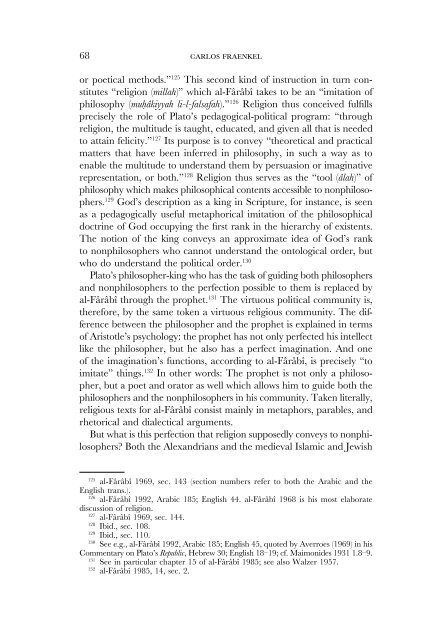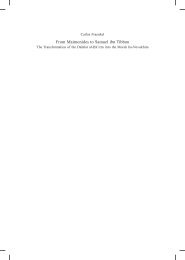Download PDF - Carlos F. Fraenkel
Download PDF - Carlos F. Fraenkel
Download PDF - Carlos F. Fraenkel
You also want an ePaper? Increase the reach of your titles
YUMPU automatically turns print PDFs into web optimized ePapers that Google loves.
68 carlos fraenkelor poetical methods.” 125 This second kind of instruction in turn constitutes“religion (millah)” which al-Fârâbî takes to be an “imitation ofphilosophy (muâkiyyah li-l-falsafah).” 126 Religion thus conceived fulfillsprecisely the role of Plato’s pedagogical-political program: “throughreligion, the multitude is taught, educated, and given all that is neededto attain felicity.” 127 Its purpose is to convey “theoretical and practicalmatters that have been inferred in philosophy, in such a way as toenable the multitude to understand them by persuasion or imaginativerepresentation, or both.” 128 Religion thus serves as the “tool (âlah)” ofphilosophy which makes philosophical contents accessible to nonphilosophers.129 God’s description as a king in Scripture, for instance, is seenas a pedagogically useful metaphorical imitation of the philosophicaldoctrine of God occupying the first rank in the hierarchy of existents.The notion of the king conveys an approximate idea of God’s rankto nonphilosophers who cannot understand the ontological order, butwho do understand the political order. 130Plato’s philosopher-king who has the task of guiding both philosophersand nonphilosophers to the perfection possible to them is replaced byal-Fârâbî through the prophet. 131 The virtuous political community is,therefore, by the same token a virtuous religious community. The differencebetween the philosopher and the prophet is explained in termsof Aristotle’s psychology: the prophet has not only perfected his intellectlike the philosopher, but he also has a perfect imagination. And oneof the imagination’s functions, according to al-Fârâbî, is precisely “toimitate” things. 132 In other words: The prophet is not only a philosopher,but a poet and orator as well which allows him to guide both thephilosophers and the nonphilosophers in his community. Taken literally,religious texts for al-Fârâbî consist mainly in metaphors, parables, andrhetorical and dialectical arguments.But what is this perfection that religion supposedly conveys to nonphilosophers?Both the Alexandrians and the medieval Islamic and Jewish125al-Fârâbî 1969, sec. 143 (section numbers refer to both the Arabic and theEnglish trans.).126al-Fârâbî 1992, Arabic 185; English 44. al-Fârâbî 1968 is his most elaboratediscussion of religion.127al-Fârâbî 1969, sec. 144.128Ibid., sec. 108.129Ibid., sec. 110.130See e.g., al-Fârâbî 1992, Arabic 185; English 45, quoted by Averroes (1969) in hisCommentary on Plato’s Republic, Hebrew 30; English 18–19; cf. Maimonides 1931 1.8–9.131See in particular chapter 15 of al-Fârâbî 1985; see also Walzer 1957.132al-Fârâbî 1985, 14, sec. 2.



